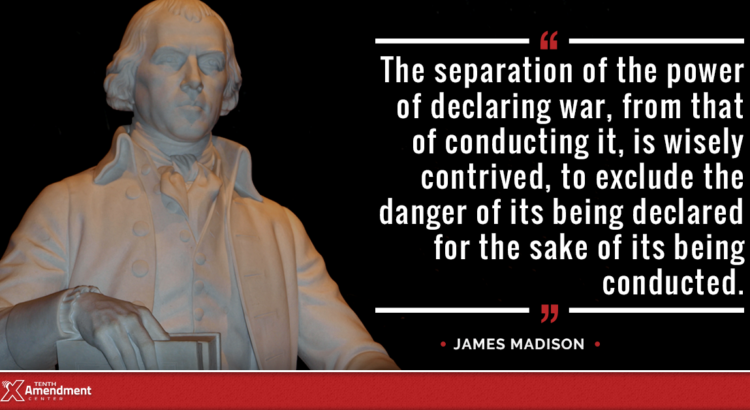The basic function and reason individuals form societies and create governments is in a single word: protection. As free individuals, we momentarily set aside our natural right of self-protection and assign that to our government (until and unless the government fails or is incapable for any reason in protecting us, at which time we are at liberty to take that right back into our own hands).
In a free society, therefore, the role of declaring war must be relegated to this basic premise, namely, that it is necessary for the protection of our natural right to life, liberty and property. It is only in totalitarian (or at the time of our founding, monarchial) systems in which war is viewed as a means to an end, e.g. conquest, enrichment, vengeance, etc. For example, the United States entered WWII because we were attacked first and our natural rights were in danger of being destroyed. Even then, when President Roosevelt asked Congress to declare war on Japan following the attack on our forces in Pearl Harbor, he made careful use of the tenses of his verbs:
“Hostilities exist. There is no blinking at the fact that our people, our territory, and our interests are in grave danger… I ask that the Congress declare that since the unprovoked and dastardly attack by Japan on Sunday, December 7, 1941, a state of war has existed between the United States and the Japanese Empire.”
On the other side of the coin, Japan and Germany went down the road to war for the examples I gave for totalitarian regimes.
In the draft of his farewell address, George Washington admonished the country “That we may be always prepared for War, but never unsheathe the sword except in self defence so long as Justice and our essential rights, and national respectability can be preserved without it.”
In his final version, these words were omitted, but if you read the version he delivered, he spent a great deal of it encouraging his fellow countrymen and those who were to follow to limit their political engagement and alliances with foreign nations unless necessary for defense.
Committing its citizens to a state of war is the gravest move that a government can make, for it places the lives, property and indeed its very existence on the line. This gravity is even greater when that nation is a free people for then liberty itself is at stake. Consequently, I believe that the wisdom spoken to us by Washington, even in draft form, behooves us to “declare” war only when such natural rights and our existence as a people is in danger.
Alas, in most of our history, very few instances fall into the category as described by President Roosevelt. Since the adoption of our Constitution, there have only been five congressionally-declared wars, and only one of them was a declaration to go to war; the other four were like FDR’s request, merely an acknowledgement that a state of war was already in existence. However, as all of us know, our past is littered with military conflicts, both on this continent and abroad, so we must ask what was the purpose for including this power of war within our Constitution? We will continue delving into that question next week.
-May 12, 2017
